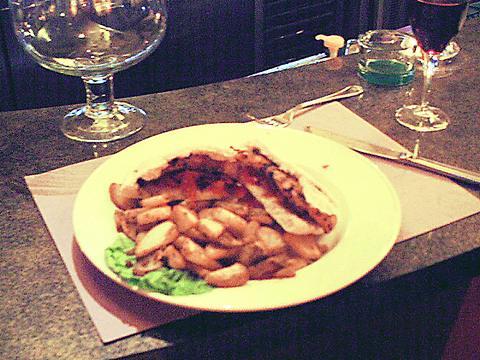Citizen Cain only does business for about eight hours each day. For the several regulars the place has attracted in the half year since it opened, that's not quite long enough.
While plans are afoot to open at noon in an attempt to draw the Tunhwa-Renai area lunchtime crowd, the regulars would rather see it stay open past 2am. That's because Citizen Cain is more of a bar than a restaurant, but anyone coming for a drink would be remiss not to sample the menu -- so why not have it open for lunch?
From the menu of sandwiches, pastas and pizzas, to the lounge music lulling from the DJ booth, and a drinks list with its own Belgian beer section, Cain is distinctly different from the row of restaurants and watering holes lining Dongfeng St.

PHOTO: DAVID MOMPHARD, TAIPEI TIMES
Whether you're wanting a full meal or a bit of bar food, you cannot go far wrong with the hummus. This Taipei rarity is served with a lightly toasted pita that you'll likely need two of -- the bowl holds more hummus than you think it does so you'd better order a second, or third. Cain Chowder and the Cainchetta are also recommended appetizers, but don't miss out on the hummus.
Keeping with the Mediterranean vein, you might want to move on to the falafel on a pita, served with homemade tahini and yoghurt. If you're petering out of pitas after the hummus but have a hankering for the tahini, you would be wise to try the Chicken Cain. Toasted French bread is filled with marinated chicken, grated cheddar and Monterey jack cheeses, tomatoes and just enough jalapenos to give it kick, then topped off with tahini.
Roasted potatoes wait patiently to be dipped in a ramekin of, yes, mustard! Finally! A restaurant that sees mustard as the superior condiment that it is.
Other sandwiches to choose from are a Cain burger, a Caesar sausage dog that's delicious, the Citizen Steak Sandwich and a chicken on a pita (these guys love pita). Perhaps most popular are Cain's pizzas, and for good reason. A flatbread crust is covered with all the things that ought to go on a pizza with nary a pea nor kernel of corn to be found; Italian salami, artichoke hearts, goat cheese, feta, smoked salmon and capers are only a few of the items you'll have to weigh in your decision-making.
The last thing on the menu that is easily digested is the menu itself -- you can actually read it and parts of it are even amusing. The pizza selection begins by saying they've "got some mo' dough' risin!" Here's another palatable tidbit from the menu: "If you are unhappy with your food, we will cover your bill -- that is the Citizen Cain guarantee."

William Liu (劉家君) moved to Kaohsiung from Nantou to live with his boyfriend Reg Hong (洪嘉佑). “In Nantou, people do not support gay rights at all and never even talk about it. Living here made me optimistic and made me realize how much I can express myself,” Liu tells the Taipei Times. Hong and his friend Cony Hsieh (謝昀希) are both active in several LGBT groups and organizations in Kaohsiung. They were among the people behind the city’s 16th Pride event in November last year, which gathered over 35,000 people. Along with others, they clearly see Kaohsiung as the nexus of LGBT rights.

Jan. 26 to Feb. 1 Nearly 90 years after it was last recorded, the Basay language was taught in a classroom for the first time in September last year. Over the following three months, students learned its sounds along with the customs and folktales of the Ketagalan people, who once spoke it across northern Taiwan. Although each Ketagalan settlement had its own language, Basay functioned as a common trade language. By the late 19th century, it had largely fallen out of daily use as speakers shifted to Hoklo (commonly known as Taiwanese), surviving only in fragments remembered by the elderly. In

Dissident artist Ai Weiwei’s (艾未未) famous return to the People’s Republic of China (PRC) has been overshadowed by the astonishing news of the latest arrests of senior military figures for “corruption,” but it is an interesting piece of news in its own right, though more for what Ai does not understand than for what he does. Ai simply lacks the reflective understanding that the loneliness and isolation he imagines are “European” are simply the joys of life as an expat. That goes both ways: “I love Taiwan!” say many still wet-behind-the-ears expats here, not realizing what they love is being an

In the American west, “it is said, water flows upwards towards money,” wrote Marc Reisner in one of the most compelling books on public policy ever written, Cadillac Desert. As Americans failed to overcome the West’s water scarcity with hard work and private capital, the Federal government came to the rescue. As Reisner describes: “the American West quietly became the first and most durable example of the modern welfare state.” In Taiwan, the money toward which water flows upwards is the high tech industry, particularly the chip powerhouse Taiwan Semiconductor Manufacturing Co (TSMC, 台積電). Typically articles on TSMC’s water demand